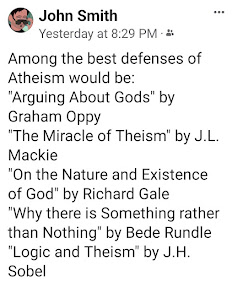The traditional argument from evil claimed that God
was incompatible with any amount of suffering, for God could, and would want
to, prevent every instance of it. Most philosophers nowadays regard that as too
strong. A certain amount of suffering might be allowed by God, provided there
is a morally sufficient reason for his allowing it—provided, in other words,
the suffering serves some greater purpose or is the unavoidable consequence of
something that justifies its existence. For instance, it may be that our having
free will is a great good which more than compensates for any evil actions
resulting from that freedom. Or it may be that certain types of suffering are
the only way to bring about something of immense value. As an example of the
latter, it is possible that in order to freely develop into the sort of beings
that God wants us to become, we must first overcome certain challenges—and
these may include disappointments, feelings of frustration, and other
experiences we would prefer not going through. (As some theists put it, God’s intention
was not to create a paradise in which to keep us perfectly happy, but to create
a place where we can grow and develop into persons worthy of spending eternity
with him.) It is also possible that an instance of suffering today is the least
terrible means of preventing a far greater amount of suffering at some future
date. Each of these, as well as several other possibilities that will be
discussed below, provides a conceivable explanation for at least some of the
bad things that happen in this world.
But
even if God is not incompatible with all suffering, he is incompatible with
suffering that cannot be justified by some outweighing benefit. Such suffering
would be senseless or gratuitous, and if we are to take seriously the claim
that God is perfectly good as well as all-powerful and all-knowing, we cannot suppose
that he would let someone suffer without reason. If one has the ability to
prevent such pointless suffering, yet fails to do so, one cannot be considered
morally perfect. It follows that there can either be a God, or there can be
senseless suffering, but not both. This leads to a very simple argument in
support of atheism:










